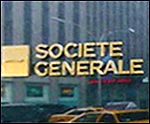 “Société Générale New York (“SGNY”) recently agreed to fork over $111,359 to the Office of Foreign Assets Control (“OFAC”) to settle charges that it facilitated a transaction by foreign persons that would have been illegal if engaged in by a U.S. person. Specifically, OFAC charged that SGNY issued two letters of credit to two non-sanctioned (and presumably) foreign parties in connection with transactions that were shipped on the Islamic Republic of Iran Shipping Lines (“IRISL”). OFAC’s pet theory of facilitation rears its ugly head yet again.
“Société Générale New York (“SGNY”) recently agreed to fork over $111,359 to the Office of Foreign Assets Control (“OFAC”) to settle charges that it facilitated a transaction by foreign persons that would have been illegal if engaged in by a U.S. person. Specifically, OFAC charged that SGNY issued two letters of credit to two non-sanctioned (and presumably) foreign parties in connection with transactions that were shipped on the Islamic Republic of Iran Shipping Lines (“IRISL”). OFAC’s pet theory of facilitation rears its ugly head yet again.
Consistent with OFAC’s practice of supplying the least amount of information possible when it reports settlement agreements, there is no information as to whether SGNY had any reason to know that the transaction involved IRISL. The letters of credit may or may not have specified the bill of lading as a documentary requirement for payment, although they probably did. Even if the bill of lading needed to be presented to SGNY as a condition to payment, it may or may not have shown IRISL as the shipper of the goods, particularly if it was issued by a freight forwarder or a NVOCC.
Why is this important? Well, it’s important because charging people with unknowing facilitation makes the already ugly head of facilitation even uglier. If a New York cab driver takes a French citizen to a meeting where that person negotiates a sale of goods from Tehran to Paris, the cab driver is guilty of unknowing facilitation. Is the cabbie required to quiz passengers on the purpose of their trips to make sure that they aren’t for the purpose of trade, even legal trade, with a sanctioned country?
There is a chance that SGNY knew, or would have known by examining the export documents presented to it, that IRISL was involved. In that case, the facilitation argument is less egregious. But OFAC should have cited that knowledge in its statement of the violation. If knowledge is not required for a facilitation violation, the only way to be sure that you aren’t going to be charged with facilitation by OFAC is to become a hermit on the Alaskan tundra.
 Permalink
Permalink
Copyright © 2011 Clif Burns. All Rights Reserved.
(No republication, syndication or use permitted without my consent.)

 Posted by
Posted by  Category:
Category: 

